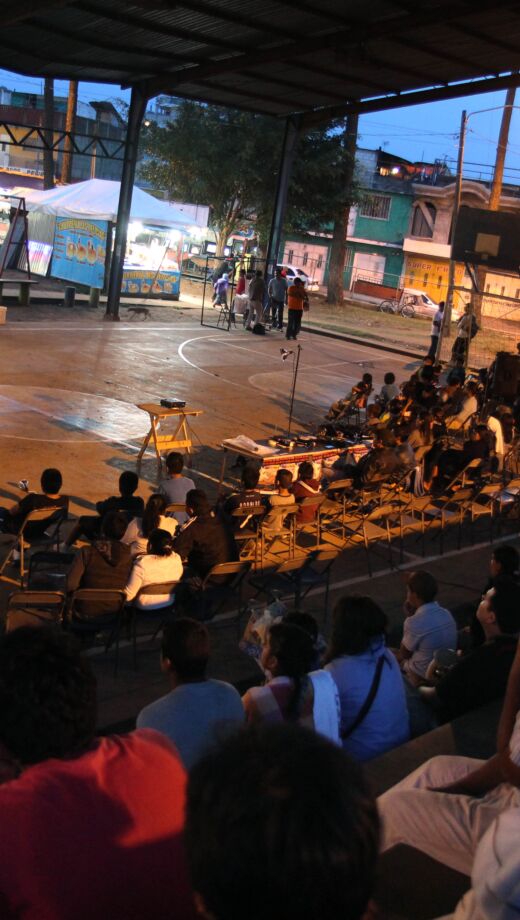
Supported projects 2019
In 2019 we provided financial support to 22 projects, often in countries where freedom of expression and open discussion about social problems are not self-evident.
Selection committee
In 2019 the selection committee of the Movies that Matter Grant Programme consisted of
- Jannie Langbroek (documentary film consultant)
- Sophie Leferink (senior advisor Freedom of Expression at Hivos)
- Raúl Nino Zambrano (head of film programmes Sheffield DocFest)
- Leon Willems (director Free Press Unlimited)
- Dirk van der Straaten (artistic director Movies that Matter until July 2019)
- Margje de Koning (artistic director Movies that Matter since September 2019)
Supported projects 2019
-
February-October 2020
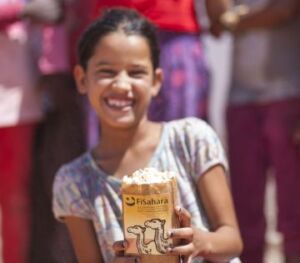 FiSahara is the annual human rights film festival held in the camps in Algeria for Sahrawi refugees from Western Sahara. The 2020 edition with screenings, workshops, international visitors and media, which was scheduled to take place in April, was suspended due to the COVID-19 pandemic. Fortunately, both film impact workshops supported by Movies that Matter could take place. A human rights film workshop for Sahrawi children was held in February of 2020, just weeks before the pandemic shut down the camps. A training on how to organize screenings and debates was re-designed to benefit Sahrawi women in the camps and took place in October-November 2020 with preventive health measures.
FiSahara is the annual human rights film festival held in the camps in Algeria for Sahrawi refugees from Western Sahara. The 2020 edition with screenings, workshops, international visitors and media, which was scheduled to take place in April, was suspended due to the COVID-19 pandemic. Fortunately, both film impact workshops supported by Movies that Matter could take place. A human rights film workshop for Sahrawi children was held in February of 2020, just weeks before the pandemic shut down the camps. A training on how to organize screenings and debates was re-designed to benefit Sahrawi women in the camps and took place in October-November 2020 with preventive health measures. -
November 2019
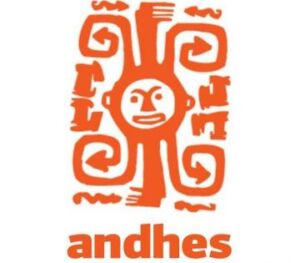 Catapulta Festival is a new festival in Tucumán, in the north of Argentina. It is organised by Andhes, a non-profit working on social change based on human rights and democracy. The first edition was an intensive four day programme in November 2019 mainly focused on gender equality and rights of the LGBTI population. Eleven long and short films, mainly Argentinean productions, were screened at the Museum of the National University of Tucuman, the municipal theatre and cultural centres. Screenings were followed by Q&A’s and panel discussions, in cooperation with many public institutions and local groups. The festival attracted more than 1700 visitors and a lot of media attention.
Catapulta Festival is a new festival in Tucumán, in the north of Argentina. It is organised by Andhes, a non-profit working on social change based on human rights and democracy. The first edition was an intensive four day programme in November 2019 mainly focused on gender equality and rights of the LGBTI population. Eleven long and short films, mainly Argentinean productions, were screened at the Museum of the National University of Tucuman, the municipal theatre and cultural centres. Screenings were followed by Q&A’s and panel discussions, in cooperation with many public institutions and local groups. The festival attracted more than 1700 visitors and a lot of media attention. -
September 2019
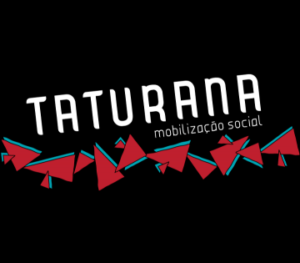 In September 2019 the first edition of the Taturana Film Festival took place in six different venues of São Paulo. Screenings of fiction and documentary films took place in many different neighbourhoods. These screenings were followed by debates. After the festival in São Paulo, the festival travelled all over the country, with 38 screenings in 12 different states. Taturana created a very useful toolkit to help educators, mediators and others to discuss the themes approached by the films. The festival helped to inform and engaged students, teachers, experts, activists and social organisations around topics related to human rights and democracy.
In September 2019 the first edition of the Taturana Film Festival took place in six different venues of São Paulo. Screenings of fiction and documentary films took place in many different neighbourhoods. These screenings were followed by debates. After the festival in São Paulo, the festival travelled all over the country, with 38 screenings in 12 different states. Taturana created a very useful toolkit to help educators, mediators and others to discuss the themes approached by the films. The festival helped to inform and engaged students, teachers, experts, activists and social organisations around topics related to human rights and democracy. -
July – December 2020
 How to integrate peace as an everyday attitude into the lives of Colombian people? During six months in 2020, the organisation Cine Vagabundo planned to screen 22 films about peace in 12 towns across Colombia to create reconciliation in Colombia. Due to COVID-19 alternative approaches were found. First of all, for four months, weekly online screenings took place on Facebook followed by a public talk. The film programme, consisting of 28 Colombian films, was also screened on two TV channels. In addition, 32 bags with DVDs with all the films were circulated, with the help of 10 Colombian partner film festivals. An estimated number of one million Colombians were reached and dozens of grassroots organizations became involved. Seven original art pieces about peace were created for developing merchandising to co-finance the initiative.
How to integrate peace as an everyday attitude into the lives of Colombian people? During six months in 2020, the organisation Cine Vagabundo planned to screen 22 films about peace in 12 towns across Colombia to create reconciliation in Colombia. Due to COVID-19 alternative approaches were found. First of all, for four months, weekly online screenings took place on Facebook followed by a public talk. The film programme, consisting of 28 Colombian films, was also screened on two TV channels. In addition, 32 bags with DVDs with all the films were circulated, with the help of 10 Colombian partner film festivals. An estimated number of one million Colombians were reached and dozens of grassroots organizations became involved. Seven original art pieces about peace were created for developing merchandising to co-finance the initiative. -
January – December 2020
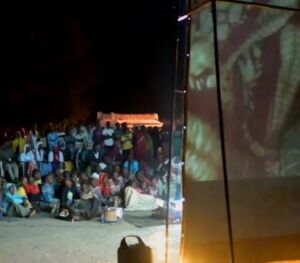 Platforms for dialogue are essential in a new democracy like in the Gambia. Following the film screenings named Sofa Cinema, in 2020 the same team is now organising similar community screenings throughout the Gambia. With their screenings about migration, climate change, gender inequality and female genital mutilation, the project expects to reach more than 6000 people.
Platforms for dialogue are essential in a new democracy like in the Gambia. Following the film screenings named Sofa Cinema, in 2020 the same team is now organising similar community screenings throughout the Gambia. With their screenings about migration, climate change, gender inequality and female genital mutilation, the project expects to reach more than 6000 people. -
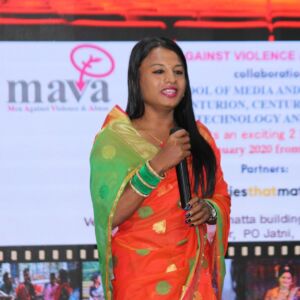 Between November 2019 and April 2020 the Indian non-profit Men Against Violence and Abuse organised 2-day travelling festivals at universities and colleges throughout India, in 7 cities and 4 district towns. They were able to engage at 2533 Indian youth on a wide range of gender and related human rights issues and advocated for a gender-equal, healthy society. The screenings of the 16 films were preceded and followed by conversations with filmmakers, protagonists, activists and experts. Audiences reported that they developed a more gender-just perspective.
Between November 2019 and April 2020 the Indian non-profit Men Against Violence and Abuse organised 2-day travelling festivals at universities and colleges throughout India, in 7 cities and 4 district towns. They were able to engage at 2533 Indian youth on a wide range of gender and related human rights issues and advocated for a gender-equal, healthy society. The screenings of the 16 films were preceded and followed by conversations with filmmakers, protagonists, activists and experts. Audiences reported that they developed a more gender-just perspective. -
August 2020
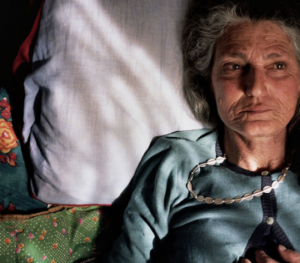 In Kazakhstan a new film festival has started. The first edition of Qara Film Festival was initially scheduled to take place in April 2020. However, with cinemas being closed due to COVID-19, the festival took place in an online format, from 6 to 9 August 2020. Eight beautiful films about human rights, gender equality, environmental rights and freedom of expression were screened for free through an online platform. The organisers reached almost 3000 visitors with these films, which were subtitled in both Russian and Kazakh. One of Qara Film Festival’s goals is to stimulate the creative, human rights documentary culture in Kazakhstan. The second festival edition will take place in September 2021.
In Kazakhstan a new film festival has started. The first edition of Qara Film Festival was initially scheduled to take place in April 2020. However, with cinemas being closed due to COVID-19, the festival took place in an online format, from 6 to 9 August 2020. Eight beautiful films about human rights, gender equality, environmental rights and freedom of expression were screened for free through an online platform. The organisers reached almost 3000 visitors with these films, which were subtitled in both Russian and Kazakh. One of Qara Film Festival’s goals is to stimulate the creative, human rights documentary culture in Kazakhstan. The second festival edition will take place in September 2021. -
September 2019
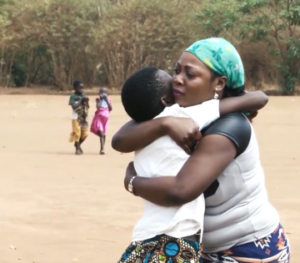 In September 2019 the third edition of the Malawi Film Festival took place in Nsanje, in southern Malawi. Two films were screened in 8 communities, reaching a total of 11.500 visitors. The NGO Positivo Malawi uses arts to boost discussion around important social issues. Screenings and debates, about women’s rights and environmental challenges, took place indoors in schools and churches. In the end, many visitors committed themselves to end the use of plastic bags, to carry out clean-ups in and around the market and to advocate against the polluting sugar industry.
In September 2019 the third edition of the Malawi Film Festival took place in Nsanje, in southern Malawi. Two films were screened in 8 communities, reaching a total of 11.500 visitors. The NGO Positivo Malawi uses arts to boost discussion around important social issues. Screenings and debates, about women’s rights and environmental challenges, took place indoors in schools and churches. In the end, many visitors committed themselves to end the use of plastic bags, to carry out clean-ups in and around the market and to advocate against the polluting sugar industry. -
February 2021
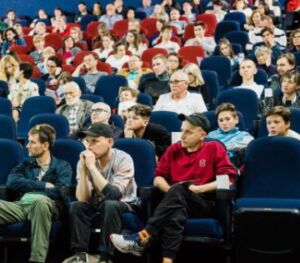 Chesnok wants to engage people in the Transnistrian region through relevant films about contemporary global problems. The 5th edition of the Chesnok human rights documentary film festival in Transnistria, was unfortunately postponed due to the Covid-19 pandemic. Movies that Matter supported broadcasting of 5 Chesnok festival films at the Moldovan television channel TV8, in order to make documentaries about human rights available for a larger audience. The broadcasted films included The Babushkas of Chernobyl by Holly Morris, and Putin’s Witnesses by Vitaliy Manskiy.
Chesnok wants to engage people in the Transnistrian region through relevant films about contemporary global problems. The 5th edition of the Chesnok human rights documentary film festival in Transnistria, was unfortunately postponed due to the Covid-19 pandemic. Movies that Matter supported broadcasting of 5 Chesnok festival films at the Moldovan television channel TV8, in order to make documentaries about human rights available for a larger audience. The broadcasted films included The Babushkas of Chernobyl by Holly Morris, and Putin’s Witnesses by Vitaliy Manskiy. -
October 2019
The first edition of the new One Step Film Forum in Myanmar took place mid-October 2019 at the Goethe Institute in Yangon. Following this, screenings were organised in other cities in Myanmar. The programme included films about human rights, justice, peace and harmony made by independent film-makers from Myanmar and other South East Asian countries. Almost 1500 people were reached in this first edition. The audience consisted of human rights activists, film enthusiasts, grass-roots communities and university students.
-
March – November 2020
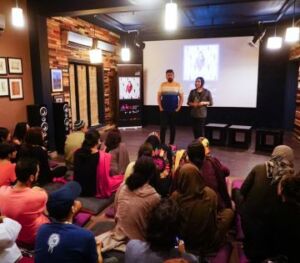 The Aks International Minorities Festival offers film, art and dialogue events for minorities and marginalized communities in Pakistan. In March 2020, just two days before officially launching the 5th edition, the festival was rescheduled, because of the lockdown. The festival now took place in two different formats. First of all, a digital festival was launched, allowing people to view films online, on Vimeo. Besides that, small private screenings were scheduled in order to include audiences that do not have a stable electricity and internet connection. Between September and November 2020 around 40 private screenings, for max 25 viewers, were held in Karachi, Lahore, Islamabad, Hyderabad, Faisalabad, Rawalpindi and Multan. Almost every screening had a debate or dialogue event to discuss the relevant subject matter. Aks also held art events and 2 theatre performances during the festival, which attracted a total of more than 3300 people.
The Aks International Minorities Festival offers film, art and dialogue events for minorities and marginalized communities in Pakistan. In March 2020, just two days before officially launching the 5th edition, the festival was rescheduled, because of the lockdown. The festival now took place in two different formats. First of all, a digital festival was launched, allowing people to view films online, on Vimeo. Besides that, small private screenings were scheduled in order to include audiences that do not have a stable electricity and internet connection. Between September and November 2020 around 40 private screenings, for max 25 viewers, were held in Karachi, Lahore, Islamabad, Hyderabad, Faisalabad, Rawalpindi and Multan. Almost every screening had a debate or dialogue event to discuss the relevant subject matter. Aks also held art events and 2 theatre performances during the festival, which attracted a total of more than 3300 people. -
August 2019 – November 2020
 Documentary Association of Pakistan (DAP) in collaboration with Interactive Resource Centre (IRC) organised a travelling documentary film festival in Pakistan, called Chalta Phirta Film Festival. The festival showcased internationally celebrated documentary films in local communities across 9 cities of Pakistan. In the first phase of the festival, the team held 13 screening events in Gujranwala, Peshawar, Karachi, Jamshoro, Quetta, Lahore, Faisalabad, Islamabad and Hyderabad, reaching over 800 people. For many of them, this was the first time they attended a documentary film festival. In March 2020, faced with the COVID-19 pandemic, a virtual program was set up, with one screening and Q&A every two weeks, for more than three months. Films were viewed online more than 11,000 times. The intense Q&As after each screening showed the enthusiasm of the audience.
Documentary Association of Pakistan (DAP) in collaboration with Interactive Resource Centre (IRC) organised a travelling documentary film festival in Pakistan, called Chalta Phirta Film Festival. The festival showcased internationally celebrated documentary films in local communities across 9 cities of Pakistan. In the first phase of the festival, the team held 13 screening events in Gujranwala, Peshawar, Karachi, Jamshoro, Quetta, Lahore, Faisalabad, Islamabad and Hyderabad, reaching over 800 people. For many of them, this was the first time they attended a documentary film festival. In March 2020, faced with the COVID-19 pandemic, a virtual program was set up, with one screening and Q&A every two weeks, for more than three months. Films were viewed online more than 11,000 times. The intense Q&As after each screening showed the enthusiasm of the audience. -
January 2021
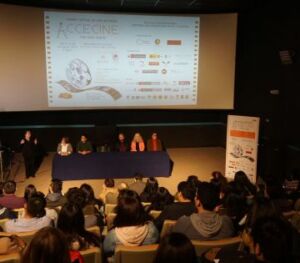 In Peru there are more than 2 million people with visual disabilities and more than 800 thousand with hearing disabilities. The main goal of the second edition of AcceCine was to promote inclusion of people with disabilities in cultural activities in Peru. Due to the pandemic, the festival moved online. About 30 films about a variety of topics were shown in accessible versions (with audio description for visually impaired people and closed caption for people with hearing disabilities). More than 25,000 people enjoyed the films. Many of the people with sensory disabilities stated that this was the first time that they were able to enjoy the contents of the films with total autonomy, since they were able to receive and understand the films. The festival also offered 15 discussions, debates, masterclasses and workshops about the accessibility of cultural activities.
In Peru there are more than 2 million people with visual disabilities and more than 800 thousand with hearing disabilities. The main goal of the second edition of AcceCine was to promote inclusion of people with disabilities in cultural activities in Peru. Due to the pandemic, the festival moved online. About 30 films about a variety of topics were shown in accessible versions (with audio description for visually impaired people and closed caption for people with hearing disabilities). More than 25,000 people enjoyed the films. Many of the people with sensory disabilities stated that this was the first time that they were able to enjoy the contents of the films with total autonomy, since they were able to receive and understand the films. The festival also offered 15 discussions, debates, masterclasses and workshops about the accessibility of cultural activities. -
April – June 2020
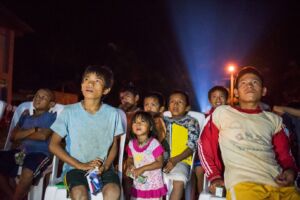 To make visible and take action against human trafficking, the Peruvian film festivals Al Este Film Festival and Censurados Film Festival join forces to organise Las Tratan: a series of film screenings with films mainly from Latin America and Eastern and Central Europe. From April to June 2020, a total of 30 films will be screened during both festivals in Lima and in the regions which are part of the three main trafficking routes in Peru. All will be followed by debates with experts, activists and artistic representatives. Trying to attract 9.000 visitors, screening locations include not only cultural centres but also open air parks and squares.
To make visible and take action against human trafficking, the Peruvian film festivals Al Este Film Festival and Censurados Film Festival join forces to organise Las Tratan: a series of film screenings with films mainly from Latin America and Eastern and Central Europe. From April to June 2020, a total of 30 films will be screened during both festivals in Lima and in the regions which are part of the three main trafficking routes in Peru. All will be followed by debates with experts, activists and artistic representatives. Trying to attract 9.000 visitors, screening locations include not only cultural centres but also open air parks and squares. -
December 2019
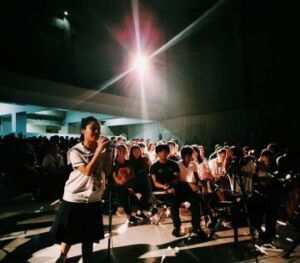
Nation in Visions Film Festival is a multi-island festival on 12 locations in the Philippines. Its first edition, from 4 to 15 December 2019, consisted of about 40 screenings and debates about the issues at stake in the country. The festival reached organisation of cultural workers and artists to bring socially relevant films to marginalized communities.
-
November 2020
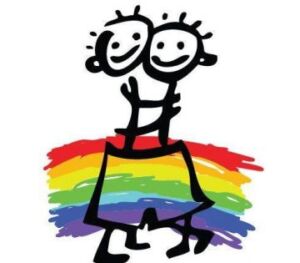 In November 2020 the opening of the Side by Side LGBT Film Festival in Saint Petersburg, Russia, was raided by an army of heavy-handed police officers. While police evacuated the premises, justified by the fabricated argument of ‘not respecting covid regulations’, a large group of nationalist and extremist anti-LGBT activists protested aggressively. Furthermore, festival organisers and partners have received death threats and threats of physical violence if they would not comply to demands of removing websites, social media and close down the organisation. Despite this repression, Side by Side presented 34 LGBTQ+ films online, organised 9 interactive events via social media, and expanded its online presence, witnessing significant growth in audiences and media. High-profile persons came forward on mass to report on the repressive actions by local authorities.
In November 2020 the opening of the Side by Side LGBT Film Festival in Saint Petersburg, Russia, was raided by an army of heavy-handed police officers. While police evacuated the premises, justified by the fabricated argument of ‘not respecting covid regulations’, a large group of nationalist and extremist anti-LGBT activists protested aggressively. Furthermore, festival organisers and partners have received death threats and threats of physical violence if they would not comply to demands of removing websites, social media and close down the organisation. Despite this repression, Side by Side presented 34 LGBTQ+ films online, organised 9 interactive events via social media, and expanded its online presence, witnessing significant growth in audiences and media. High-profile persons came forward on mass to report on the repressive actions by local authorities. -
January – May 2020
 Sunshine Cinema is a South African solar powered cinema network. They use relevant documentary and feature films to spark dialogue, educate, and inspire social change on issues of land, gender equality and active citizenship. The Sunbox Ambassadorship Programme empowers young entrepreneurs from resource scarce communities, by giving them mobile mini cinema kits (Sunbox) to hold screenings in their own and surrounding communities. In the first six months of 2020, with screenings in South Africa and Zambia, the Sunbox ‘ambassadors’ aim to reach about 2200 people in their communities.
Sunshine Cinema is a South African solar powered cinema network. They use relevant documentary and feature films to spark dialogue, educate, and inspire social change on issues of land, gender equality and active citizenship. The Sunbox Ambassadorship Programme empowers young entrepreneurs from resource scarce communities, by giving them mobile mini cinema kits (Sunbox) to hold screenings in their own and surrounding communities. In the first six months of 2020, with screenings in South Africa and Zambia, the Sunbox ‘ambassadors’ aim to reach about 2200 people in their communities. -
January 2020
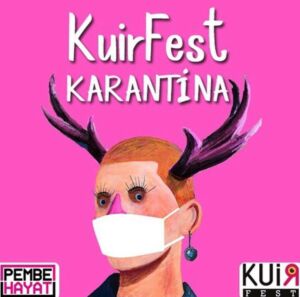 The 9th Pink Life QueerFest, took place in Istanbul in January 2020. At the opening ceremony the film Transfinite was screened to 400 audiences. During the festival, 67 films were screened and numerous talks and panels were held in a variety of venues in Istanbul, including the old cinema house Vault34, attracting more than 3000 visitors. Through participation of international and national guests, activists and audience in the discussions, workshops and parties, this edition of the festival managed not only to bring together the community, but also create dialogue spaces for queer art, activism and LGBTI+ issues. When COVID-related measures were installed in March 2020, additional screenings in Ankara, Denizli and Diyarbakır were cancelled and Pink Life brought the festival online. In this project, called QueerFest Quarantine, one film was made available online on each Sunday, for six weeks, for another 1000 people. In order to increase the areas of expression required by queer art, QueerFest continues its endeavours to further enhance the Online Film Platform.
The 9th Pink Life QueerFest, took place in Istanbul in January 2020. At the opening ceremony the film Transfinite was screened to 400 audiences. During the festival, 67 films were screened and numerous talks and panels were held in a variety of venues in Istanbul, including the old cinema house Vault34, attracting more than 3000 visitors. Through participation of international and national guests, activists and audience in the discussions, workshops and parties, this edition of the festival managed not only to bring together the community, but also create dialogue spaces for queer art, activism and LGBTI+ issues. When COVID-related measures were installed in March 2020, additional screenings in Ankara, Denizli and Diyarbakır were cancelled and Pink Life brought the festival online. In this project, called QueerFest Quarantine, one film was made available online on each Sunday, for six weeks, for another 1000 people. In order to increase the areas of expression required by queer art, QueerFest continues its endeavours to further enhance the Online Film Platform. -
January – February 2020
 Sürdürülebilir Yasam Film Günleri (Sustainable Living Film Days) will organise the first edition of a touring programme through 10 Turkish cities. They will screen 12 films that were part of earlier editions of the affiliated Sustainable Living Film Festival. The festivals in each city consists of two days of screenings in universities and cultural centres followed by talks and panels aiming for 3.000 visitors. In each town local (human rights) NGO’s are involved to create awareness about human rights and common ground for collaboration.
Sürdürülebilir Yasam Film Günleri (Sustainable Living Film Days) will organise the first edition of a touring programme through 10 Turkish cities. They will screen 12 films that were part of earlier editions of the affiliated Sustainable Living Film Festival. The festivals in each city consists of two days of screenings in universities and cultural centres followed by talks and panels aiming for 3.000 visitors. In each town local (human rights) NGO’s are involved to create awareness about human rights and common ground for collaboration. -
December 2019
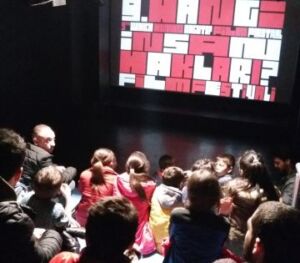 In December 2019 the 10th edition of Which Human Rights? Film Festival takes place in Istanbul, Turkey. During the five day event around 35 films will be screened in three cultural venues in (European and Asian) parts of Istanbul. The main theme this year is forced disappearances, while other topics include women’s rights, refugees rights, LGBTI+ rights. The festival aims to reach 4.000 visitors and also includes several side events such as round table discussions, forums and talks on humanitarian issues featuring prominent human rights activists in Turkey.
In December 2019 the 10th edition of Which Human Rights? Film Festival takes place in Istanbul, Turkey. During the five day event around 35 films will be screened in three cultural venues in (European and Asian) parts of Istanbul. The main theme this year is forced disappearances, while other topics include women’s rights, refugees rights, LGBTI+ rights. The festival aims to reach 4.000 visitors and also includes several side events such as round table discussions, forums and talks on humanitarian issues featuring prominent human rights activists in Turkey. -
August 2020
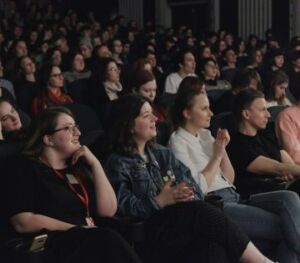 Almost half of Ukrainian citizens claim that the rights of LGBTI individuals should be restricted. As a result, the LGBTI community faces many threats. By presenting 25 films related to sexuality, queerness and gender, the Kyiv International Short Film Festival (KISFF) created a space for discussion about these topics in the programme called Sexuality Matters. Besides some physical screenings in the Kyiv Rus cinema, the 9th edition of KISFF took place mostly online. From 5-9 August 2020, around 6000 people watched the Sexuality Matters programme, that was carried out in partnership with several organisations including the NGO Insight LGBTQ, Cedos Think Tank, Political Critique Ukraine, Hmarochos and Amnesty International.
Almost half of Ukrainian citizens claim that the rights of LGBTI individuals should be restricted. As a result, the LGBTI community faces many threats. By presenting 25 films related to sexuality, queerness and gender, the Kyiv International Short Film Festival (KISFF) created a space for discussion about these topics in the programme called Sexuality Matters. Besides some physical screenings in the Kyiv Rus cinema, the 9th edition of KISFF took place mostly online. From 5-9 August 2020, around 6000 people watched the Sexuality Matters programme, that was carried out in partnership with several organisations including the NGO Insight LGBTQ, Cedos Think Tank, Political Critique Ukraine, Hmarochos and Amnesty International. -
November 2019
 The first edition of this human rights film event took place in November and December 2019. Screenings and debates in Caracas, Baruta and Chacao were put together by Gran Cine, a non-profit distributor of high-quality cinema in Venezuela. Besides screenings in a commercial cinema in Caracas, films were screened in various cultural centres in Caracas and other cities. The films deal with situations of human rights in non-democratic countries and will be followed by debates. A total of 3500 visitors attended the first Muestra de Cine de Derechos Humanos.
The first edition of this human rights film event took place in November and December 2019. Screenings and debates in Caracas, Baruta and Chacao were put together by Gran Cine, a non-profit distributor of high-quality cinema in Venezuela. Besides screenings in a commercial cinema in Caracas, films were screened in various cultural centres in Caracas and other cities. The films deal with situations of human rights in non-democratic countries and will be followed by debates. A total of 3500 visitors attended the first Muestra de Cine de Derechos Humanos.
Newsletter
Do you want to stay up to date with all Movies that Matter news, promotions and special screenings? Sign up for our newsletter.
Subscribe to our Industry newsletter or Educational newsletter (in Dutch) here